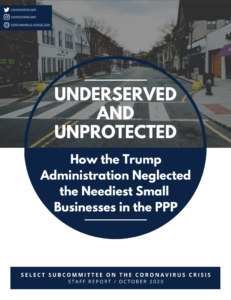 Underserved and Unprotected: How the Trump Administration Neglected the Neediest Small Businesses in the PPP
Underserved and Unprotected: How the Trump Administration Neglected the Neediest Small Businesses in the PPP
U.S. House of Representatives Select Subcommittee on the Coronavirus Crisis
First published October 2020
This report provides preliminary findings from the Select Subcommittee’s ongoing investigation of the implementation of the Paycheck Protection Program (PPP) by the Small Business Administration (SBA) and the Department of the Treasury (Treasury). The report finds that contrary to Congress’s clear intent, the Trump Administration and many big banks failed to prioritize small businesses in underserved markets, including minority and women-owned businesses. As a result, small businesses that were truly in need of financial support during the economic crisis often faced longer waits and more obstacles to receiving PPP funding than larger, wealthier companies.
Congress established the PPP in the Coronavirus Aid, Relief, and Economic Security (CARES) Act in March 2020 to help small businesses and non-profit organizations survive the coronavirus crisis by providing forgivable loans to cover payroll, rent, and utility payments. The CARES Act urged SBA to issue guidance “to ensure that the processing and disbursement of covered loans prioritizes small business concerns and entities in underserved and rural markets,” including businesses owned by veterans, members of the military community, socially and economically disadvantaged individuals, and women.
On June 15, 2020, the Select Subcommittee launched an investigation into the Trump Administration’s implementation of the PPP following reports that the program favored larger companies over the neediest small businesses. The Select Subcommittee sent letters to SBA, Treasury, two banking industry associations, and eight financial institutions: JPMorgan Chase (JPMorgan), Citibank (Citi), PNC Bank (PNC), Bank of America, U.S. Bank, Truist, Wells Fargo, and Santander. The Subcommittee obtained over 30,000 pages of documents, conducted briefings, and interviewed community lenders and other stakeholders. The Subcommittee also obtained detailed loan data from seven financial institutions.
Download Resource